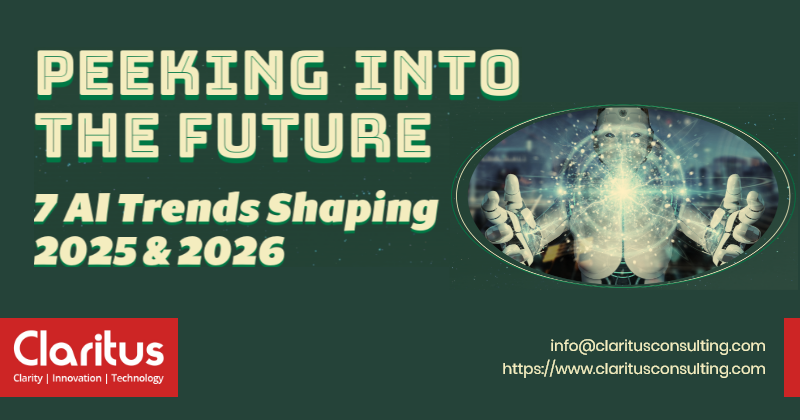Peeking into the Future: 7 AI Trends Shaping 2025 & 2026
Artificial Intelligence (AI) is no longer a buzzword or the exclusive domain of tech enthusiasts; it’s a transformative force reshaping industries, economies, and societies. As we edge closer to 2025 and 2026, AI’s trajectory is becoming even more fascinating. Let’s dive into seven pivotal AI trends that are set to redefine our world in the next few years.
Hyper-Personalized Customer Experiences
AI is revolutionizing customer engagement by creating hyper-personalized experiences. By 2025, businesses will move beyond mere demographic targeting to leverage real-time behavioural and emotional analytics. AI will analyze vast amounts of data from IoT devices, wearables, and online interactions to understand customer preferences at an unprecedented level.
Imagine walking into a retail store where AI systems predict your preferences, suggesting items tailored to your style and budget. E-commerce platforms will become even smarter, offering predictive shopping carts that pre-fill based on your buying history, weather conditions, and social trends. This shift will blur the line between online and offline shopping, making every interaction with brands more intuitive and impactful.
Democratization of AI Tools
Gone are the days when AI development was the privilege of tech giants. By 2026, we’ll see a surge in the availability of low-code and no-code AI platforms, empowering small businesses and individual creators to harness AI’s potential.
These platforms will offer plug-and-play solutions for complex tasks like natural language processing, image recognition, and predictive analytics. Small-scale industries, from local artisans to niche startups, will adopt AI to optimize operations, create personalized marketing campaigns, and innovate product designs. Democratized AI will not only level the playing field but also spur innovation across diverse sectors.
Ethical AI and Responsible Governance
As AI’s capabilities grow, so do concerns about its ethical implications. By 2025, ethical AI will no longer be optional but a standard practice. Governments, organizations, and researchers will establish stricter frameworks to ensure AI systems are transparent, fair, and accountable.
Expect to see AI audits becoming a norm, where algorithms are regularly reviewed for biases and inaccuracies. Industries will invest in explainable AI (XAI) systems, making decision-making processes understandable even to non-technical stakeholders. Ethical AI will be pivotal for building public trust, especially in sensitive sectors like healthcare, finance, and law enforcement.
AI-Powered Healthcare Revolution
The healthcare industry is poised for a seismic shift, driven by AI innovations. By 2026, AI will significantly enhance diagnostics, treatment planning, and patient care. From predictive health analytics to AI-assisted surgeries, the integration of AI will reduce human errors and improve efficiency.
AI will empower wearable devices to provide real-time health monitoring, enabling proactive healthcare interventions. Virtual health assistants powered by AI will manage chronic conditions, remind patients about medications, and even offer mental health support. This evolution will make healthcare more accessible, affordable, and precise, transforming the global health landscape.
AI-Augmented Workplaces
The workplace of 2025 will look vastly different from today, thanks to AI. Automation will handle repetitive and mundane tasks, allowing employees to focus on creative and strategic initiatives. Collaborative AI tools will redefine teamwork, offering real-time insights, automating workflows, and fostering innovation.
Expect AI-powered digital twins of office environments, where businesses simulate and optimize operations before implementing changes. AI-driven learning platforms will enable personalized skill development, helping employees stay relevant in a rapidly changing job market. Far from replacing jobs, AI will augment human potential, making workplaces more dynamic and productive.
Generative AI Going Mainstream
Generative AI—systems capable of creating text, images, and even videos—will become a cornerstone of digital content creation. By 2026, AI models like OpenAI’s GPT and Adobe’s Firefly will empower businesses to produce high-quality, customized content at scale.
This trend will revolutionize marketing, entertainment, and education. For instance, brands will create immersive virtual experiences for customers, educators will design personalized learning modules, and filmmakers will leverage AI for visual effects and scriptwriting. Generative AI will not only speed up content creation but also inspire a new era of creativity and innovation.
AI in Sustainability and Smart Cities
Sustainability will be a defining challenge of the coming decade, and AI will play a crucial role in addressing it. By 2025, AI will optimize energy consumption, waste management, and resource allocation in smart cities, making them more sustainable and efficient.
AI-powered systems will manage traffic flows to reduce emissions, predict maintenance needs for infrastructure, and optimize renewable energy grids. In agriculture, AI will enhance precision farming, increasing yields while conserving resources. These advancements will align economic growth with environmental conservation, paving the way for a sustainable future.
Case Study: The AI Impact
Case Study 1: Personalized Medicine with AI
We implemented AI algorithms for a leading healthcare provider to analyze patient data and predict individual responses to treatments. This approach reduced hospital readmissions by 25% and improved patient outcomes, showcasing the transformative potential of AI in personalized medicine.
Case Study 2: Smart City Energy Management
A metropolitan city approached us to deployed AI-driven systems to monitor and optimize its energy grid. The initiative led to a 30% reduction in energy waste and improved grid reliability, setting a benchmark for sustainable urban development.
What Lies Ahead?
The next few years will witness AI becoming an integral part of our daily lives, driving innovation across industries. However, with great power comes great responsibility. As we embrace these advancements, it’s imperative to prioritize ethical practices, inclusivity, and sustainability.
Whether it’s enhancing customer experiences, revolutionizing healthcare, or building smarter cities, the possibilities with AI are limitless. Businesses that invest in understanding and adopting these trends today will not only stay ahead of the curve but also contribute to a brighter, AI-powered future.
Let’s step into 2025 and 2026 with curiosity, caution, and a commitment to leveraging AI for the greater good. The future is not just near; it’s here, and it’s brimming with opportunities.

